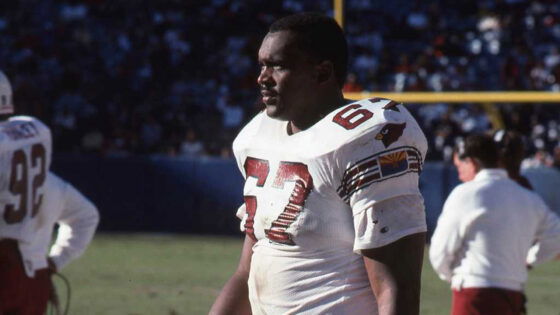“I’m doing well, I feel a sense of purpose now. I feel more significant than I ever did when I was playing professional football. My life is better today.” You don’t hear that often from someone who once stood under the brightest lights. His path wound through Pro Bowls and prison cells, national broadcasts and recovery clinics. That was Luis Sharpe. Always willing to talk if he thought it might help someone else. In his later years, he spoke often in churches and recovery centers around Detroit, sometimes across the country. He talked about addiction, jail, and the decisions that wrecked his life. He didn’t sugarcoat it. And he didn’t try to turn it into something neat. His story came in pieces. What he survived. What he lost. What he was still trying to hold onto.
That voice, so often shared in church basements and recovery rooms, is now gone. Sharpe was 65.
He’d been a Pro Bowl left tackle. Smart, fluent in Spanish and English, active in the community, the kind of player the team leaned on when they needed someone to speak publicly or show up in the room. But by the mid-1990s, everything had started to fall apart. He was living in a Tempe motel, struggling with addiction daily, and avoiding anyone who tried to reach him. One day, former teammates Roy Green and Larry Lee showed up, wrapped him in duct tape, and drove him to the Betty Ford Clinic in Palm Springs. He stayed a few days, then walked out, paid a $550 cab fare, and went back to Phoenix.
In time, he stepped away from the places that had once defined him. In 2019, Sharpe moved back to Detroit, where he’d grown up and still had family. He’d spent years trying to make sense of his life, and Detroit gave him space to do that. He found structure in his faith, strength in daily routines. He started speaking at recovery centers and churches, sharing pieces of his story with anyone who might need to hear them. He didn’t pretend to have all the answers. But people listened anyway, because he was honest about the work. “I feel more significant than I ever did when I was playing professional football,” he once said.
Today, Cardinals fans, former teammates, and team leadership, as echoed by Michael Bidwill’s heartfelt tribute, remember Sharpe’s legacy far beyond the gridiron. The Arizona Cardinals echoed this collective grief in a poignant tribute on social media. Team owner Bidwill wrote, “Throughout his lengthy and accomplished career with the Cardinals, Luis Sharpe exhibited an uncommon type of strength and toughness that made him so successful as a player. Admirably, he would later demonstrate those same traits in dealing with the personal challenges he faced when his career was over.” It’s a message layered with meaning because those who knew Sharpe best saw that his perseverance extended far beyond the football field. The Cardinals emphasized their deepest condolences to his family and former teammates.
— Arizona Cardinals (@AZCardinals) July 12, 2025
There were stretches when life came apart. He lost his marriage. He lost his footing. In 2007, his daughter Leah was killed in an incident. He never stopped talking about her. He never blamed anyone else. Over time, he started speaking more plainly about what he’d lived through. Not to make sense of it, but to help others survive it. When he left Arizona in 2019 and returned to Detroit, it was a reset. “I had to get away from old playmates and old playgrounds,” he said.
In his later years, the toll of the game began to show. He spoke candidly about the memory lapses, the headaches that wouldn’t go away. He suspected it was all connected — the countless head-on collisions from UCLA to the NFL, the practices where helmets were weapons. “We were taught to get your head in there,” he said. “If you didn’t, you were seen as weak.” He never received a formal diagnosis, but he saw enough signs to be worried. Some days, he couldn’t hold a conversation without losing his train of thought. He gave up managing his own bills. And yet, he kept going.
Sharpe’s story wasn’t just marked by personal battles. It was shaped by his unwavering connection to the NFL fraternity. His example lives on in the league’s ongoing efforts to bolster mental health support for retired athletes.
Fans salute Luis Sharpe’s legacy
The post “Rest in Peace”: NFL Legend of Cuban Descent Dies at 65; Tributes Pour In From Cardinals Owner & Fans appeared first on EssentiallySports.
